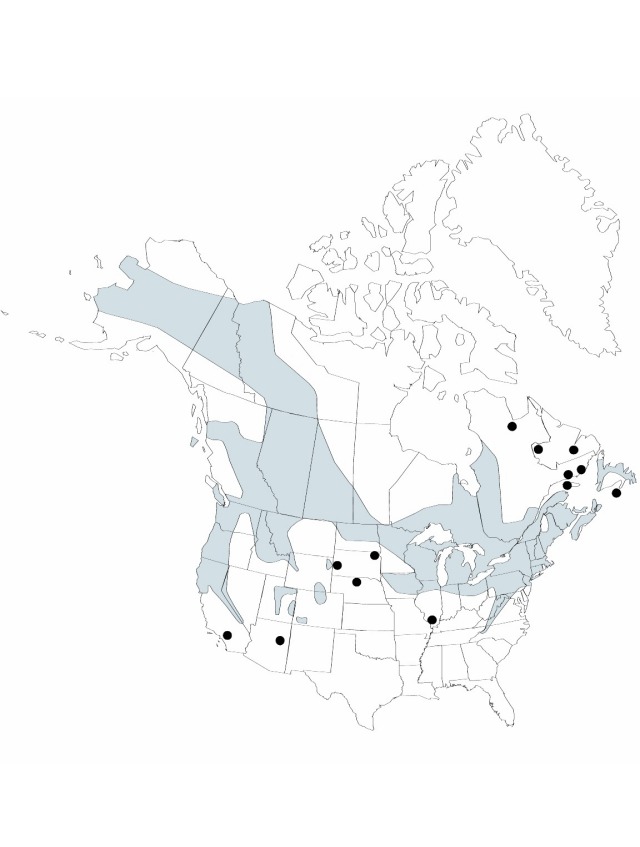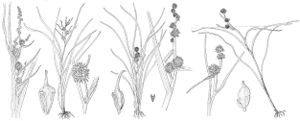Difference between revisions of "Sparganium emersum"
Verhandlungen des Naturforschenden Vereins in Brunn 10: 80. 1872.
FNA>Volume Importer |
FNA>Volume Importer |
(No difference)
| |
Revision as of 19:01, 24 September 2019
Plants robust to slender, to 2 m; leaves and inflorescences emergent, stiff, or some or all leaves floating, limp. Leaves when erect rather stiff, partially to entirely keeled, flat, to 0.8 m × 4–10 mm; floating leaves limp, keeled at least near base, to 2 m × 4–18 mm. Inflorescences: rachis unbranched, erect; bracts ascending to erect, often somewhat inflated toward base; pistillate heads 1–6, contiguous or not, proximal axillary and peduncled, distal supra-axillary and sessile, 1.6–3.5 cm diam. in fruit; staminate heads 3–7(–10), contiguous or not with each other, sometimes some contiguous and some not, but not contiguous with distalmost pistillate head. Flowers: tepals without subapical dark spot, tip erose; stigmas 1, linear-lanceolate. Fruits green to reddish brown, lustrous, stipitate, fusiform, slightly constricted below equator, body not faceted, 3–4 × 1.5–2 mm excluding stipe, tapering to beak; beak straight to curved, 2–4.5 mm; tepals attached at base, reaching about to equator. Seeds 1. 2n = 30.
Phenology: Flowering late spring–early fall (May–Oct southward, Jun–Aug northward).
Habitat: Still to flowing eutrophic and mesotrophic, circumneutral to somewhat alkaline waters, sometimes abundant
Elevation: 0–3000 m
Distribution

St. Pierre and Miquelon, Alta., B.C., Man., N.B., Nfld. and Labr., N.W.T., N.S., Ont., P.E.I., Que., Sask., Yukon, Alaska, Ariz., Calif., Colo., Conn., Idaho, Ill., Ind., Iowa, Maine, Md., Mass., Mich., Minn., Mont., Nebr., Nev., N.H., N.J., N.Y., N.C., N.Dak., Ohio, Oreg., Pa., S.Dak., Utah, Vt., Va., Wash., W.Va., Wis., Wyo., Eurasia.
Discussion
Less robust plants of Sparganium emersum are found from Manitoba, Minnesota, and Iowa, east to the Atlantic coast. They have erect leaves, 3–7 mm wide, much exceeding the short inflorescence; supra-axillary, sessile, and crowded pistillate heads; and 3–4 mm fruits with a 3–4 mm beak. Such plants have been called S. emersum subsp. acaule (C. D. K. Cook and M. S. Nicholls 1986), and they are widely known as S. chlorocarpum Rydberg var. acaule or S. chlorocarpum f.orma acaule. Inasmuch as they often grow with and are not always clearly distinct from typical plants, and in the absence of definitive, range-wide studies, they are recognized here only as a form (fide E. G. Voss 1966; G. E. Crow and C. B. Hellquist 1981).
Sparganium emersum is easily confused with S. angustifolium, especially when floating leaves are present, but it is distinguished by its leaves which are triangulate at least at the base, by its often more numerous staminate heads, at least some of which are not contiguous, and by its greenish fruits with longer beaks (C. D. K. Cook and M. S. Nicholls 1986). In northern and northwestern states and British Columbia, it resembles S. angustifolium in the distribution of the staminate heads, the distal of which tend to be confluent. Some Cook and Nicholls noted that sSome characters of S. angustifolium might have been incorporated into S. emersum, and our plants could be a stable hybrid that differs somewhat from S. emersum as it is known in Europe (C. D. K. Cook and M. S. Nicholls 1986). G. E. Larson (1993) called for further study of the entire S. emersum-S. angustifolium complex, which is perhaps better treated as one variable species, S. angustifolium (T. C. Brayshaw 1985)
Hybrids with Sparganium hyperboreum and S. natans have been reported from Europe but are doubted by C. D. K. Cook and M. S. Nicholls (1986). In eastern provinces and states, S. emersum could be confused with S. americanum and S. androcladum, but it can be distinguished from them by its supra-axillary pistillate heads and its tepals lacking a subapical dark spot.
Selected References
None.
